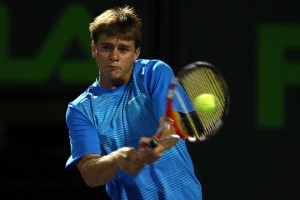Ryan Harrison was granted just one hour of practice time, along with the rest of the main draw on Easter Sunday, the day before the first round of the Sarasota Open, and from first ball to last there were no goof offs, no jokes across the net and no bantering with the small mob of fans bunched in to get a look at what they pray will be another American top-10.

There is no mistaking this physically strong teenager’s talent. He’s got a serve that seems to put on another 10 mph every year as his game evolves, a forehand that crackles, even on the green clay here, and a backhand slice — a real feel shot — that is coming along nicely.
But if Harrison, whose 19th birthday is less than two weeks away, is to reach elite status on the ATP tour, I’m convinced that it’s going to be primarily with what I like best about him.
Hard work.
There’s a strong belief out there, to which I subscribe, that apart from those handful of very special athletes like Rafa Nadal, Novak Djokovic and Roger Federer, there is about that much difference (hold thumb and forefinger about a half-inch apart) among the vast majority of the top players in men’s tennis, and what separates a top-10 from No. 50 is less about talent and more about the amount of work you put into the game.
Yes, Ryan Harrison has talent. And so do scores of other players. But Jim Courier proved long ago that you don’t have to have more gift than every other player to reach No. 1. Not if you out-work the field.
This won’t be easy in 2011 and beyond. The game is a lot more global than it was when Courier was winning French Opens in the early 1990s, and there are a lot more eastern Europeans and South Americans who are as hard-working and hungry to win as Harrison.
Still, he’s running on the right track — literally running on the right track the last two weeks, in fact, which he spent training with Andy Roddick in Austin, Texas.
After Ryan’s Easter morning practice, I sat down with him to talk about his commitment to tennis and what it was like spending the last couple weeks with Roddick.
It was up at 7 a.m., breakfast at 7:30 and on the running track from 9 to 11 before the first of two-a-days on the court. On average, five to seven hours a day of on- and off-court work designed to push him hard.
How hard? “Let’s just say I had no trouble getting to sleep at 10 p.m.,” he replied.
“The first couple days were rough, getting up at 7. But then I got into the routine.” It was a routine he badly needed to snap him out of a mini-streak of losses, and he’s come down the road from his training quarters in Bradenton, Fl., seeking a title at this $75,000 Challenger that could, conceivably, take him from his current personal-best of No. 128 to top-100.
“No shortcuts.” That’s something Harrison says a lot. And he understands the theory about hard work trumping players who have great talent and don’t work hard. “Absolutely. Obviously, you have to have talent. But I think it’s like everything in life. You work hard, you’re going to have the best chance to succeed. Eventually, I’m hoping it will pay off.”
I’m not looking for Harrison to bolt to top 20 at age 19. But what I’d expect from him this year is the kind of consistency that comes with maturity. He’s had a good year with a Challenger win in Hawaii and wins over three top-50s at Indian Wells before a round-of-16 7-6, 6-3 loss to Federer, though he’s had disappointing first-round losses in his last two tournaments.
Still, he’s at a career high ranking and there is nothing at this point that suggests he won’t continue a methodical rise in his fortunes.
It’s the maturity that strikes you most about Harrison. You don’t often hear this sort of command of the language and cogent thinking from 18-year-olds, and it’s obvious that he’s been raised by a couple of savvy parents — Susie and Pat, who coached him for years before stepping away in 2010.
“My dad taught me everything I know as far as being a person,” he said. And that includes Ryan’s commitment to hard work.
“As a child, I never had to be told to do something if it was presented to me as a challenge, I’d kill myself getting it done, whether it was trying to be the best in school or tennis. When I had a lull or lack of motivation, my dad would make it into some kind of competition.”
With a family at home, Pat Harrison isn’t going to be traveling 28-30 weeks a year with Ryan, who is still searching for a full time coach. Right now he’s working with former ATP pro Scott McCain, who will accompany him to Europe for a $50,000 Challenger in Zagreb (May 9-15) before he moves on to the French Open. After that, who knows?
“I’m not looking for a guy for just six months,” said Harrison. He wants a long-term arrangement, and there will be no lack of quality coaches who would like that job because Harrison is the perfect pupil.
He’s got a big game with big talent, and the one thing every coach begs for from every player-client — hard work.
